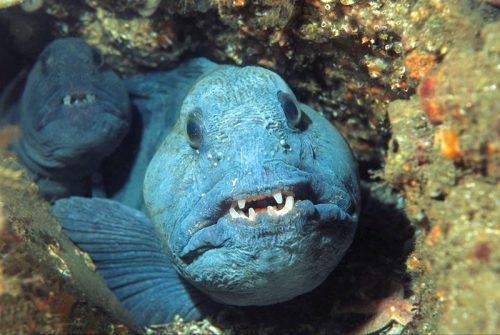Blue Marine Foundation is pleased to announce an ambitious programme to improve the conservation of fish and the incomes of fishermen in UK coastal waters thanks to a generous donation from Superdry co-founder, Julian Dunkerton.
Charles Clover, executive director of BLUE, said: “We are absolutely delighted that Julian Dunkerton has agreed to fund a whole series of new projects all over the UK that we hope will create benefits for the environment and in the process bring benefits for fishermen and local communities.”
The latest phase of BLUE’s work will initially include conserving wrasse, Atlantic wolffish, North Devon herring, whelk and cuttlefish through targeted research and working with local fishermen.

In the first year of the new programme BLUE will work in four coastal areas: North Devon, Jersey, St Abbs and Eyemouth, and South West Scotland.
Over the next six years it aims to work in a total of 13 areas, including its original projects of Lyme Bay where it developed a “win-win” model for fishing and conservation and the Solent where it is introducing millions of native oysters.
BLUE’s Lyme Bay project, established in 2012, brought fishermen improved catches and improved port infrastructure as well as fostering a recovery in many marine species and habitats. The scheme has also shown that people are prepared to pay more for sustainably-caught fully traceable fish.
Among the projects that will now go ahead are research into the unmanaged fishery for wrasse on the South West Coast of Scotland. Fishermen have moved into potting for wrasse which are used by salmon farms to eat parasites, but the dynamics of the population are little studied. Research will make management recommendations.
Another project will study the population of wolffish, which are known to be unusually abundant in the St Abbs and Eyemouth Voluntary Marine Reserve. Wolffish are toothy crustacean-feeders which are not commercially targeted but caught as bycatch in bottom trawl fisheries. They are known to control the density and distribution of seabed creatures such as sea urchins and brittle stars.

The research will enable the UK to make recommendations internationally for the management of this declining species and the protection of its habitat.
In Jersey, BLUE will monitor the recovery of maerl – a term for dense beds of hard seaweed – an extremely slow-growing species susceptible to damage by dredging, fishing gears and heavy anchors in the island’s new marine reserves. Maerl is known to provide nursery areas for scallops and young fish.
BLUE will also look into the future of marine conservation designations in a conference on “marine parks” in Plymouth in June.


















